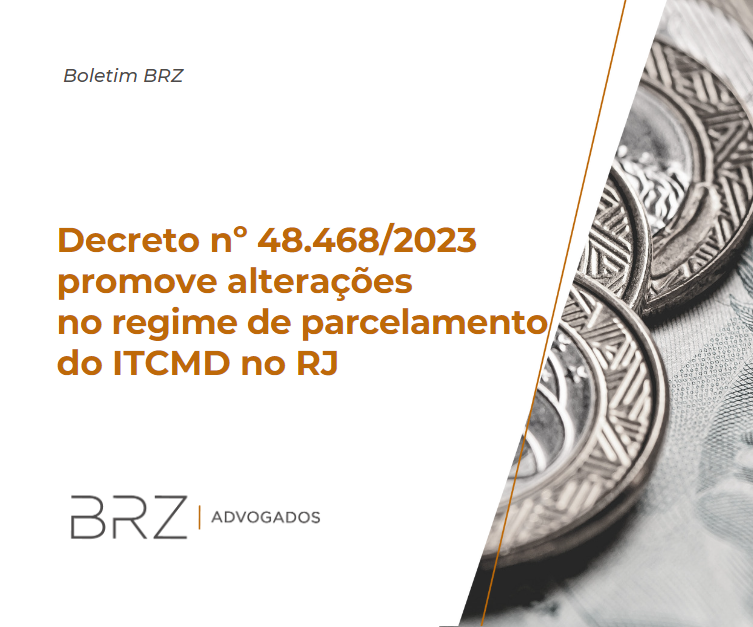Tax Reform Approved

Lawyers criticize the taxation of dividends of self-employed professionals.
Federal government tax reform proposal resumes taxation on dividends
The rate of 20% had been approved on Wednesday (09/01) but was reduced to 15%. The amendment to the bill, submitted by Congressman Baleia Rossi (MDB-SP), suggested exempting companies of self-employed individuals, such as lawyers, medical doctors and accountants.
The National Bar Association defended the rejected amendment. According to the Federal Council of the Association, the taxation on dividends would be harmful to typically middle-class professions, would cause double taxation on profits and give companies of self-employed professionals the same treatment as the one of shareholders of companies.
“Proposing equal treatment for different taxpayers, especially as regards the form of organization, is not the most appropriate way to achieve the goals of debureaucratization and simplification,” explains Wilson Sales Belchior, a partner at the RMS Advogados firm and advisor to the Federal OAB.
The lawyer also does not believe it to be pertinent to justify the changes in tax legislation by comparing it to other countries, “where several economic flows are predominant”.
For Fernando Facury Scaff — lawyer, USP professor and our columnist — the vote was rushed which rendered it impossible to have a comprehensive and qualified debate. According to him, this measure will have negative repercussions on the economy, in addition to causing tax litigation and making individuals open legal entities for tax purposes.
“This is even more tragic for self-employed professionals, for these are professionals who associate with each other to provide personal and individualized services, which are now going to have an incentive to be fragmented into multiple different legal entities. Anyway, it’s a bad tax policy decision. I hope the Senate overturns it”, Scaff adds.
Unwanted changes
Camila Mazzer de Aquino, senior lawyer in the tax area of BRGC Advogados, makes a point to criticize it because if actually goes against the claims and requirements of associations of professionals, such as law firms. According to her, the bill was submitted and voted without holding a comprehensive debate with the many sectors that are impacted by it.
“The taxation on dividends directly impacts the corporate structures adopted by several companies, including those with foreign capital, created with the premise that shareholders could be remunerated with tax exemption and also corporate operations, such as the conversion of profits into capital, which were carried out to increase tax efficiency in corporate reorganizations”, she notes.
According to Douglas Guidini Odorizzi, partner of firm Dias de Souza Advogados, “the injustice here is clear when self-employed professionals are denied having their professions treated in the appropriate manner given that their business has distinctly different characteristics than that of business activities in general.” He stresses that, in the companies constituted by these professionals, virtually all profit is distributed to their partners and associates, who are then subject to taxation. In regular LLCs and corporations, part of the business is having profits reinvested in the company.
For tax lawyer Arthur Barreto, from law firm Donelli and Abreu Sodré Advogados, the Congress’ decision is based on a false notion that members of legal entities do not pay taxes on profits. “Under the pretext of tax justice, there is an increase in the tax burden on the members without an equivalent reduction for legal entities”, he says.
He also points out that the approved bill may cause each payment made to members outside of the purview of their remuneration to be interpreted as a disguised distribution of profits — which would require complex and costly oversight.
Rejected amendment would exempt law firms from dividend taxation
Geraldo Wetzel Neto, partner and tax coordinator at Bornholdt Advogados law firm, says that the taxation on dividends of self-employed professionals could make sense as an isolated idea. However, it should only be discussed after the vote of a comprehensive tax reform and administrative reform, given that the current tax burden is of more than 40% of the GDP and state services are poorly provided: “Looking solely at the income tax does not solve anything.”
In addition to the proposal to create the contribution on goods and services (CBS) at a single rate of 12%, the lawyer indicates that the taxation on dividends of self-employed professionals would increase the tax burden of this sector “from the current 15% to 20% to something between 32% and 37%”.
In the opinion of Deborah Toni, a lawyer specialized in Business Law and a partner at Deborah Toni Advocacia, taxation on profits and dividends will make it impossible to continue the activities of any business. She also understands that the proposal “discourages innovative initiatives” and leaves room for double taxation — when the legal entity receives payments and in the income tax return of the natural person partner. “The tax reform approved by Congress has an extremely negative impact on business owners”, she states.
Gustavo Vaz Faviero, coordinator of the Tax Law department of Diamantino Advogados, also highlights the increase in the total tax burden resulting from the taxation of dividends, especially in what regards presumptive profit companies. According to him, the reduction in the rates of the legal entity income tax and social contribution on net income (CSLL) “will not be sufficient to offset such measure”.
Faviero also asserts that the bill does not correct the gap in the income tax table and that the simplified discount was reduced by also taxing people who are not business owners. “Companies will hurry to distribute profits while the exemption is in force and several debates on the subject will arise, increasing tax litigation,” he affirms.
The National Federation of State and District Tax Authorities (Fenafisco) considers that the reform proposal “is insufficient to reduce economic and social inequality in the country”. In a statement, the entity said it is favorable to the return of the tax on profits and dividends but stressed that the rate of 15% and the lack of progressivity would leave the proposal “far below its collection capacity and unjustifiably below the taxation on labor income”.
According to Fenafisco, the highest strata of society, with monthly earnings above 240 minimum wages, are exempt from taxation on 70% or more of their income. Thus, the ideal would be to focus on taxing the super-rich and spare the most vulnerable demographics.
Not a big advancement
The reduction of the tax rate from 20% to 15% is seen with good eyes by taxpayers. According to lawyer Paulo Octtávio Calháo, partner at law firm Ogawa, Lazzerotti and Baraldi Advogados, the measure approved “somewhat mitigates the increase in the tax burden that this reform implements but does not bring equality in taxation levels”.
Despite the 15%, tax lawyer Gustavo Taparelli, a partner at firm Abe Giovanini, indicates that the global incidence of income tax and social contribution of legal entities will increase substantially. “Companies will now become very apprehensive, because they still can’t plan for what’s to come next year,” he adds.
Despite denying the exemption, the Congress decreased the rate from 20% to 15%
Although the decrease in the rate makes taxation to capital gain the same as taxation on investment, Fábio Nieves Barreira — partner in the tax area of Viseu Advogados and a former judge of the São Paulo Tax and Fees Court (TIT) — also believes that there will be an increase in the disguised distribution of profits and consequently disputes arising from the tax authorities.
Given that “Simples Nacional” companies are exempt, Barreira points out that the trend is the opening of several companies in this regime, or of companies with revenues of up R$4.8 million to provide services to a parent company.
Eduardo Muniz Cavalcanti, tax partner at Bento Muniz Advocacia, also stresses the progress of the project in relation to the scaled decrease in legal entity income tax to 8%, to the forecast reduction of CSLL and the update of the natural persons income tax table. However, he believes that the impact will be negative in the market, “especially in the production sector, with risks of divestments and possible retraction, given the increase in the tax burden, in addition to the revocation of important tax benefits granted to economic sectors, such as health, education and construction”.
Carlos Eduardo de Arruda Navarro — a judge at TIT-SP, professor at FGV Law School and partner at Galvão Villani, Navarro and Zangiácomo Advogados — would rather celebrate the decrease in the rate: “The reduction to 15% makes current taxation more similar to future taxation. At the level of 20%, we would experience an increase in the tax burden in the comparison with the current scenario “.
Tax analyst Thiago Sarraf, from Nelson Wilians Advogados, understands that dividend taxation is an expected move and states that this is a fairly common practice in other countries. Therefore, the proposal approved by Congress, with the reductions of rates, would be an advance in the original text. “We should all be careful when quantifying the taxation so as not to discourage the business activity, which is already burdened by several other taxes (including the income tax required of companies)”, he warns.
#taxreform #dividends #taxlaw #incometax



